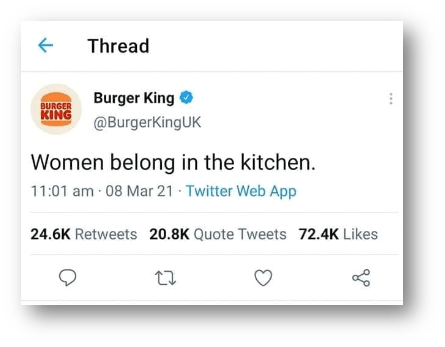


Beware Humor on Social Media – the Joke May Be on You and Your Reputation
By Thom Fladung, Hennes Communications
The funny thing about trying to be humorous on social media is that it’s too often not funny – and can be quite damaging.
Exhibit 1: On March 8, Burger King United Kingdom posted this to Twitter: “Women belong in the kitchen.”
On International Women’s Day.
The motivation actually was pure. Burger King is providing scholarships to women who work at its restaurants, encouraging them to move up the ranks to become chefs and head chefs in the industry.
This tweet was designed as a clever tease for the good news to come.
Clearly, the execution fell short.
Burger King apologized: “We hear you. We got our initial tweet wrong and we’re sorry. Our aim was to draw attention to the fact that only 20% of professional chefs in UK kitchens are women and to help change that by awarding culinary scholarships. We will do better next time.”
And apologized again an hour later: “We decided to delete the original tweet after our apology. It was brought to our attention that there were abusive comments in the thread and we don’t want to leave the space open for that.”
Exhibit 2: Flash back a few weeks earlier, when Will Wilkinson, a vice president at the Niskanen Center think tank, made a joke.
He wrote, “If Biden really wanted unity, he’d lynch Mike Pence.” The, um, joke being that former Vice President Pence at that point was hated on the right and left.
Shortly after, Wilkinson was fired.

Jerry Taylor, the think tank’s president, wrote: “As an organization, the Niskanen Center appreciates and encourages interesting and provocative online discourse. However, we draw the line at statements that are, or can in any way be interpreted as condoning or promoting violence. As such, the Niskanen Center has, with a heavy heart, parted ways with Will Wilkinson.”
The inevitable then ensued on social media. A hysterical debate between those who said Wilkinson got what was coming and those who said this was more “cancel culture” that could happen to any of us.
We side with Bloomberg News columnist Sarah Green Carmichael who wrote, “That’s right. It can happen to anyone…who jokes on Twitter about lynching the vice president.”
Also, as Carmichael wrote, this isn’t about free speech or cancel culture. It’s about employability. And people who think they have unlimited free speech on social media are deluding themselves.
Now, compare these failed attempts at humor with a famous success, which also happened to involve a United Kingdom fast-food chain.
Kentucky Fried Chicken outlets in the U.K. had the lovely experience of running out of …of all things … chicken. Almost all of them. A new delivery provider screwed up logistics and most of KFC’s 900 locations were temporarily shut down.
Where did people who wanted Kentucky Fried Chicken in the U.K. go to voice their complaints? They went to social media. And then they called the cops.
Which prompted the Manchester Police to tweet: “Please do not contact us about the #KFCCrisis – it is not a police matter if your favourite eatery is not serving the menu that you desire.”
What was KFC to do? They did this, on Twitter:

Along with a very effective apology that read, in part: “A chicken restaurant without any chicken. It’s not ideal. Huge apologies to our customers, especially those who travelled out of their way to find we were closed. …It’s been a hell of a week, but we’re making progress, and every day more and more fresh chicken is being delivered to our restaurants. Thank you for bearing with us.”
Here are two takeaways from all of this: Leave humor on social platforms to professional comedians (that’s the same counsel we give our media training clients who try to be funny but wind up cringeworthy in media interviews). And if you feel compelled to try it, humor on social media is far and away safest when it’s self-deprecating, when it cites your own error and takes yourself to task, as in the example with KFC.
But beware trying it with sensitive social issues and controversial current events.
Here’s some more advice: If you suspect you may have to explain your social media post, don’t post it.
Thom Fladung, managing partner of Hennes Communications, loves a good joke. And he can help if the joke’s on you or your reputation, on social media or anywhere else. Contact him at fladung@crisiscommunications.com or 216-213-5196. No kidding.